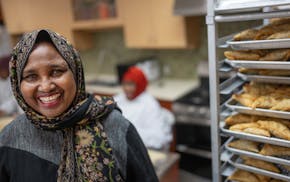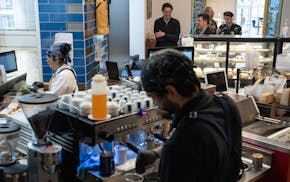If you like your daily cup of coffee, be prepared to pay even more for it as shops like Twin Cities' SK Coffee absorb higher costs from tariffs.
Already, historically low yields in the largest coffee-growing countries of Brazil and Vietnam had raised the cost of beans. That was on top of increases in the past few years as the Ukraine-Russia war caused fertilizer prices to rise. And in addition to higher interest rates and labor shortages on coffee farms.
Nate Broadbridge, co-founder and head of finance for SK Coffee, said the cost for coffee beans will likely never come back down.
Pricing is determined by the so-called C-Market — a futures trading platform similar to those that set prices for oil, soybeans, corn and grains.
Employee costs — both wages and benefits — also are higher. SK Coffee added health care and dental insurance and 401(k) matches for employees right before the cost of coffee went up.
Rent and utility bills also have risen. And with competition growing, marketing expenses are a must for many coffee operations, they said.
Coffee shops, he said, could choose to cut staff or wages to avoid raising prices. But that's not something SK Coffee wants to do.
"We're all just really hoping people choose to stay with us, and maybe instead of buying a $20 cocktail twice a week, buying a $5 coffee three times a week," Broadbridge said.
The U.S. imports almost all beans used to produce coffee here, according to the federal Department of Agriculture.
Companies from Folgers to Starbucks, Maxwell House and Nestle are competing for the smaller harvests. Commodity-grade coffee that was $1.88 a pound last year on the futures markets is now trading closer to $4.
"Everybody is trying to clamor for the same harvests, which are only 50 to 60 percent of what they were the year before," Broadbridge said.
The result is that coffee giants like Starbucks are starting to buy higher-grade coffee, driving up prices for mid-tier buyers such as Peace Coffee and Intelligentsia, Broadbridge said.
This filters down to small roasters like SK Coffee that buy specialty coffee. What was in the $5 to $8 a pound range is now $6 to $9.
The silver lining, he said, is that you're probably drinking better coffee across the board.
Tariffs a final factor for many
Now, costs are even higher with President Donald Trump's 10% tariffs.
"On a $150,000 container of coffee, we would have to wire $15,000 to the U.S. government to clear the coffee," said Noah Namowicz, chief operating officer of Minneapolis-based Cafe Imports, one of the largest coffee importers in the state.
Velasquez Family Coffee in St. Paul is estimating an $8,000 duty on its container of coffee, said CEO Cathy Velasquez. The company has imported one container annually for the past 20 years from her husband's family's farm in Honduras.
Between the market prices and the tariffs, Velasquez said they will likely need to increase prices. The company also is facing higher costs for bags and roasting expenses.
"We have to give our family a fair price based on what's in the market," she said. "With the tariff, we're waiting to see what will happen because we need to incorporate that as well."
Trump has said his administration would raise tariffs more in many countries in May. The question many coffee shops are asking, Broadbridge said, is when to increase prices.
Duck Duck Coffee owner Kat Naden said she is used to the uncertainty. She opened the south Minneapolis cafe four months before the pandemic. But the current state of things is not in her favor.
The south Minneapolis cafe serves coffee and egg sandwiches, and egg costs also have skyrocketed because of the bird flu epidemic.
"Even before tariffs, there wasn't much money in coffee," Naden said. "But as long as we're bringing in people's wages and a little more, that's fine by me."
Making the higher price worth it
With more and more local operators in the mix with national chains such as locally based Caribou and Seattle-based Starbucks, the market is highly saturated, which can make margins even thinner.
Houston White thinks the next wave of coffee will come down to who can differentiate themselves from the competition.
That's part of the mission of a joint venture between Houston, who owns Get Down Coffee, and Dogwood Coffee owners Dan and Angie Anderson: Sweet Renaissance Coffee Academy provides training for aspiring barista and roasters.
"What I didn't realize until a year ago is that the real superpower of Get Down is how my story and experience in the South is brought to each cup and shared with the world," White said.
The partners also began noticing a lack of representation in the coffee industry, Dan Anderson said, even examining their own business model and drink offerings.
"Starbucks is a model built on Italian espresso drinks imported into America, like macchiatos, cappuccinos, which is a beautiful culture within coffee, but one of the eye-opening things here is that's just one part. There's so much more to explore and see," he said.
Alex Castañeda and Yadira Huidor-Alvizo, graduates of Sweet Renaissance, have now launched their own brands: Port 2050 and Ruda Coffee.
Port 2050 specializes in single origin, microlots.
Ruda Coffee is "where Mexican specialty coffee meets the exciting world of wrestling." All the coffee is produced by female farmers.
Sweet Renaissance also is launching a "Beverage Takeover," which will allow trainees and graduates to develop a drink that represents themselves or their culture.
The first drink — a black sesame matcha by Annie Chen — will launch in May for Asian American Pacific Islander Heritage Month.

Somali-owned Hoyo will soon see its sambusas in Lunds, at the State Fair and a new batch of school districts

Trump once tried to buy the Minnesota Twins. His new budget bill could complicate team's sale.

Why now might be the best time to make a deal on boats, ATVs and other powersports

To reset downtown Minneapolis skyway life, building owners cut deals with retailers

